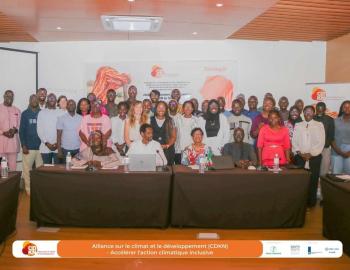Enhancing the resilience and sustainability of local communities through inclusive climate action in Senegal
Enhancing the resilience and sustainability of local communities through inclusive climate action in Senegal
Context
Senegal’s economy is largely based on the agricultural sector, including livestock farming, fishing and forestry. This means that the country is vulnerable to the impacts of climate change, as well as land degradation, deforestation, coastal erosion and the deterioration of ecosystems. This directly affects local communities. Various adaptation strategies are being implemented to respond to climate variability.
Through its positioning, CDKN Senegal aims to mobilise a dynamic alliance to highlight relevant experience and proven evidence, for the benefit of communities. CDKN Senegal's ambition is to respond to the need for political dialogue on local development, to provide useful resources for action, and to help identify and implement solutions for ecosystem-based adaptation, while integrating gender and social inclusion (GESI), as well as climate finance and its prospects for community development.
CDKN Senegal will focus on the coastal zone (North), forest ecosystems (South) and mangrove ecosystems (Centre), to produce and disseminate knowledge that can be integrated into local development plans.
Project objectives
The Senegal programme’s main objective is to promote climate-resilient, gender-sensitive and socially inclusive development in the country. To achieve this objective, the project will focus on three priority areas:
- Gender equality and social inclusion (GESI): Supporting the integration of gender and social inclusion into policies and practices.
- Finance for resilience: Enabling access to appropriate and equitable finance for climate-resilient development.
- Ecosystem-based adaptation (EbA): Strengthening the implementation of ecosystem-based adaptation in a way that is equitable and adapted to local conditions.
Project activities
- Production and dissemination of knowledge
- Creation of a catalogue of best practices on land and ecosystem restoration (Resource Centre).
- Mapping of agricultural risks and local initiatives for agro-ecological and energy transitions.
- Drawing up local climate-sensitive development plans and developing teaching tools for environmental education.
- Capacity enhancing
- Training producers through peer learning.
- Promoting women's empowerment, particularly through access to land, sustainable equipment and training in women's leadership.
- Organisation of boot camps for young people and educators.
- Dissemination of knowledge
- Sharing proven approaches to local and ecosystem-based adaptation.
- Lobbying for access to innovative funding and its integration into public policy.
- Dissemination of guides and teaching tools in schools.
- Climate finance
- Setting up financing mechanisms for small local economic units.
- Developing bankable projects for agro-industries and local authorities.
Project outputs
The Resource Center is a digital and mobile platform that centralises knowledge on climate and sustainable development. It is intended to be a space for sharing and disseminating knowledge, made available to various categories of actors involved in local climate action. In this sense, it intends to promote interactions between projects and between different themes (LLA, LIFE-AR, EbA , Loss and Damage, Sustainable Land Management, etc.)
Contact
For more information contact:
Jean Pascal Corréa, CDKN Senegal - Country Engagement Lead on e-mail correa.jpascal@gmail.com or LinkedIn
Amanda April, CDKN Africa country manager on e-mail Amanda.april@southsouthnorth.org

